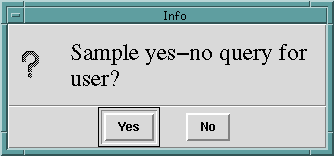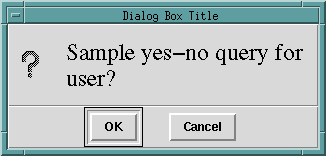yes_no_dialog/[2,3,4,6]
Module: alsdev
yes_no_dialog/[2,3,4,6] — present a yes/no dialog
FORMS
yes_no_dialog(Msg, Answer)
yes_no_dialog(Msg, Title, Answer)
yes_no_dialog(Interp, Msg, Title, Answer)
yes_no_dialog(Interp, Msg, Title, YesLbl, NoLbl, Answer)
DESCRIPTION
These dialogs present popup dialogs with a question and two buttons to the user. The shorter versions are defined by:
yes_no_dialog(Msg, Answer) :-
yes_no_dialog(Msg, ' Info ', Answer).
yes_no_dialog(Msg, Title, Answer) :-
yes_no_dialog(tcli, Msg, Title, Answer).
yes_no_dialog(Interp, Msg, Title, Answer) :-
yes_no_dialog(Interp, Msg, Title,
' Yes ', ' No ', Answer).
For the general call
yes_no_dialog(Interp, Msg, Title, YesLbl, NoLbl, Answer)
Interp, Msg, Title, YesLbl, and NoLbl should all be atoms, and Answer should be an uninstantiated variable.
EXAMPLES
The call:
? - yes_no_dialog(' Sample yes-no query for user ? ',
Answer) .
produces the following popup dialog:

If the user clicks “ Yes “, the result is Answer = Yes while clicking “ No “ yields Answer = No.
The call:
yes_no_dialog(tcli,
' Sample yes-no query for user ? ',
' Dialog Box Title ',
' OK ', ' Cancel ', Answer) .
produces the popup dialog:

Clicking “ OK “ yields Answer = OK while clicking “ Cancel “ yields
Answer = Cancel.
NOTES
The default Tcl interpreter for yes_no_dialog/4 and yes_no_dialog/6 is tcli as shown above. This interpreter is _NOT_ automatically initialized by alsdev. You must first run init_tk_alslib/0 or init_tk_alslib/1, or run init_tk_alslib/2 with Interp = tcli. If you wish to run yes_no_dialog/4 or yes_no_dialog/6 with Interp bound to a Tcl interpreter I other than tcli, you must first run init_tk_alslib/2 with Interp bound to this same I (only once is necessary).